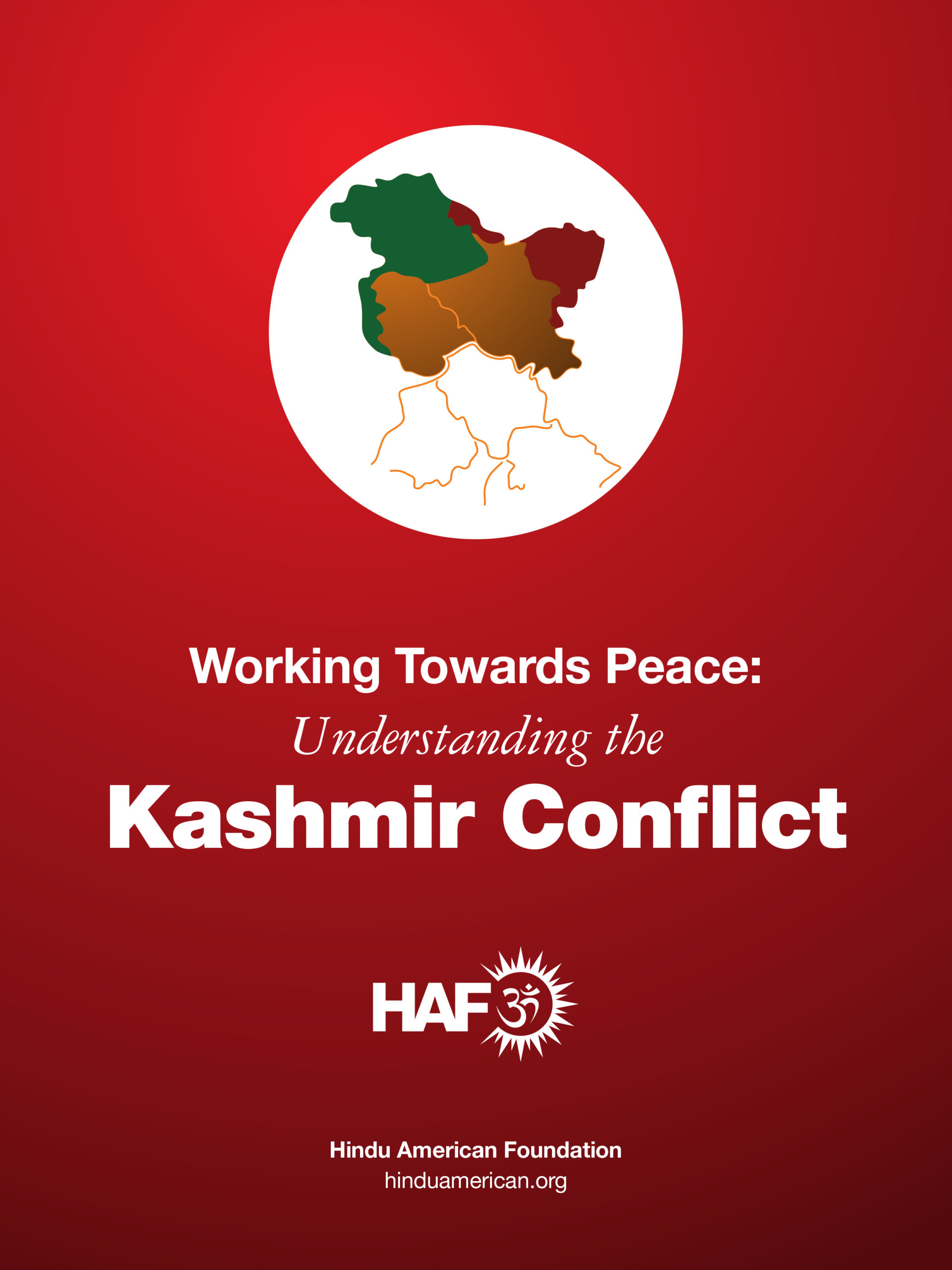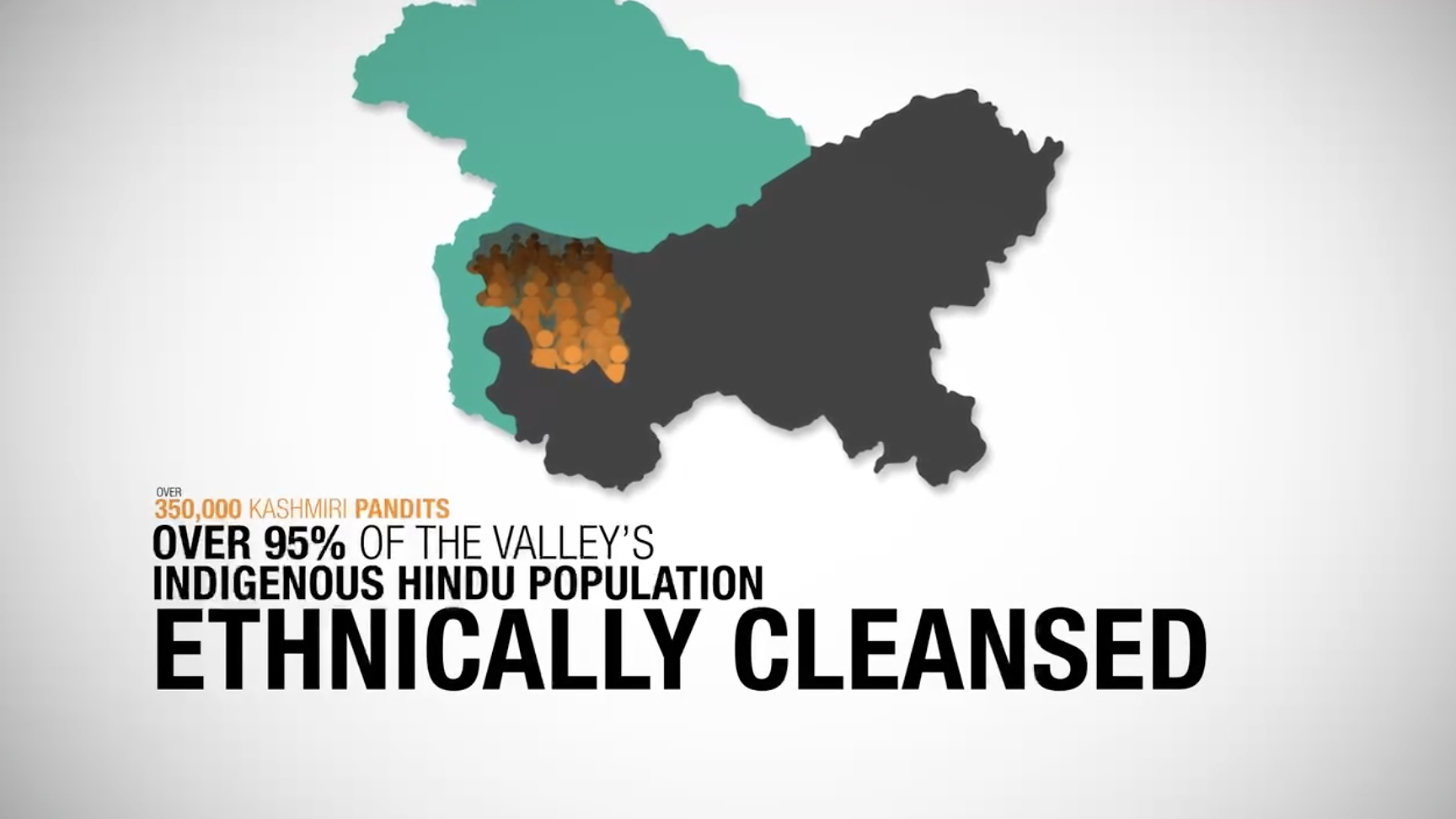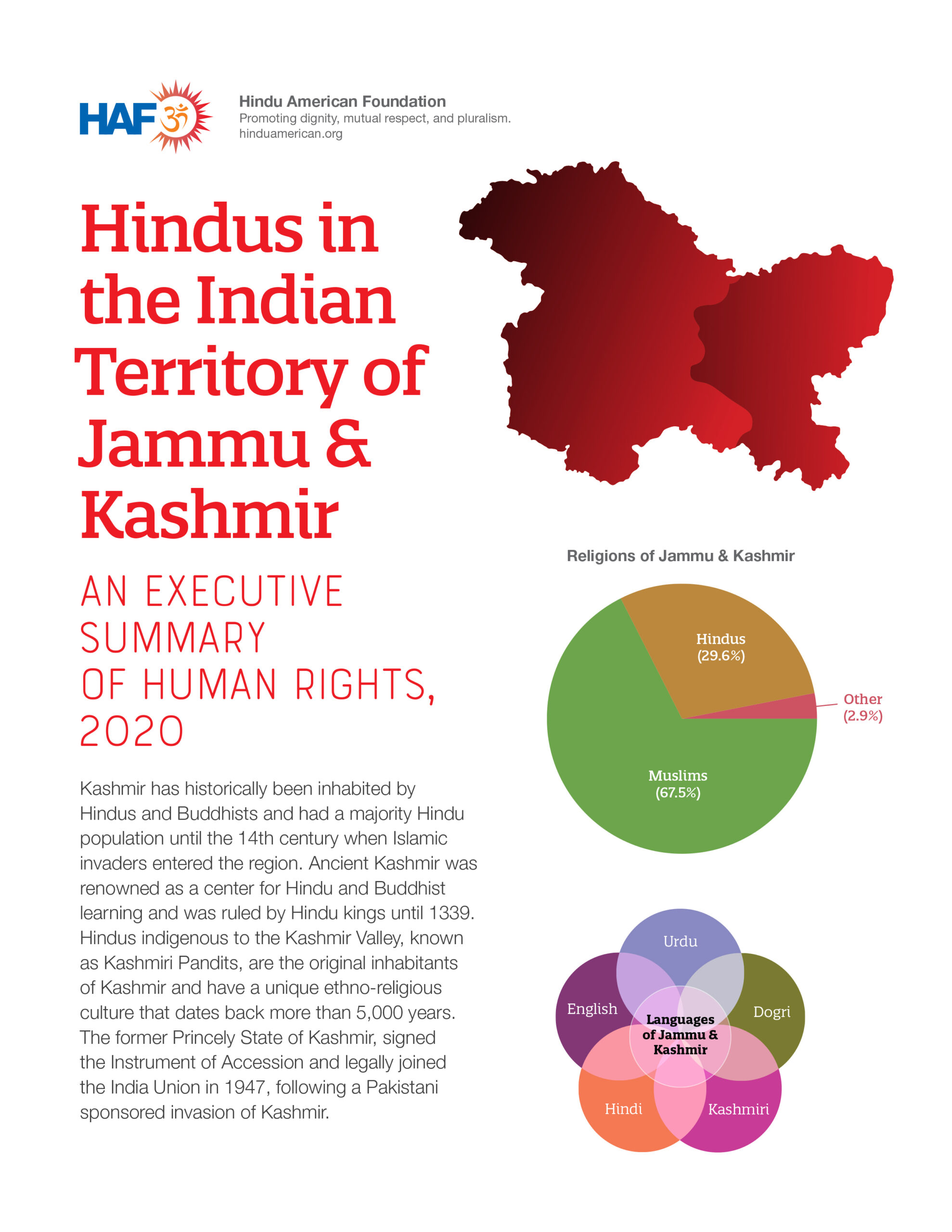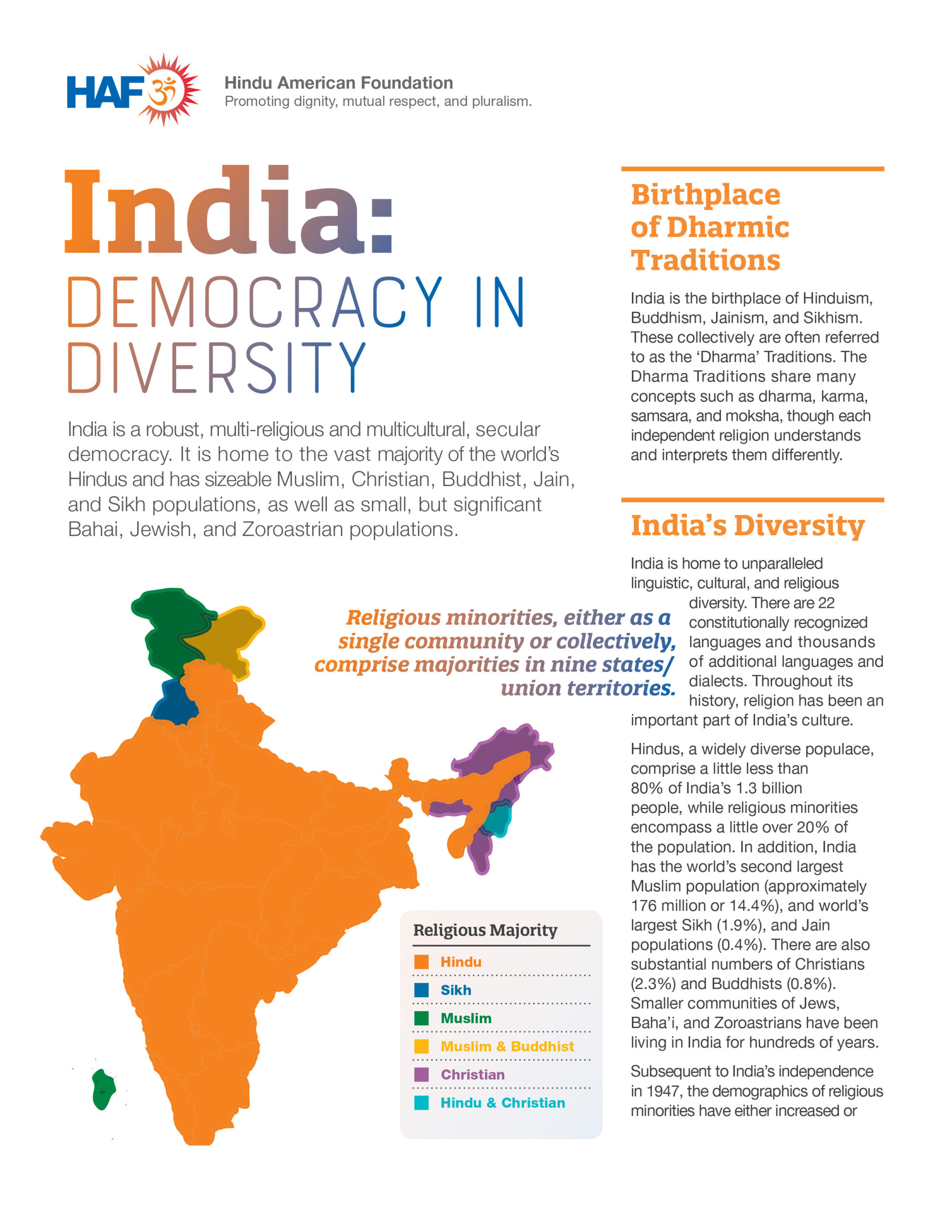What just happened in Kashmir
A message from our Executive Director
Take Action
HAF Commentary
-
Leading media say the Pahalgam attack wasn’t about Islamism and history doesn’t matter. They are wrong.
-
The real connections between Kashmir and Gaza aren’t what activists are telling you
-
LISTEN – That’s So Hindu podcast: Pakistan’s support for terrorism won’t stop until it’s held accountable | Michael Rubin
-
The Kashmir conflict isn’t about independence and democracy. It’s about expanding theocracy in South Asia.
-
FAQs About Kashmir and Articles 370/35A
-
In August 2019, leading Western media failed in their coverage of Kashmir
Community Talking Points
Raising awareness about the struggle for peace in Kashmir breaks the cycle of silence and brings attention to the actual history and human toll the headlines too often obscure. But engaging on this topic with your local elected leaders or local newspaper, or a colleague, teacher, even your own child, might feel daunting. There’s so much information and misinformation out there. It may have not only you, but the people you’re communicating with confused.
We’ve made it easier for you to talk (or write) about Kashmir to increase understanding, support peace-building, and demand accountability.
Communicating with Elected Officials
Human Rights & Religious Freedom
- Over 350,000 Kashmiri Hindu Pandits were ethnically cleansed from the Valley (1989–1991). Most remain displaced 30+ years later.
- These events involved targeted killings, rapes, and destruction of homes and temples — a clear case of religious persecution.
- US policy on international religious freedom and human rights should consider this context.
Terrorism and US National Security
- Pakistan-backed militant groups, like Lashkar-e-Taiba (LeT) and Jaish-e-Mohammed (JeM), are designated as Foreign Terrorist Organizations by the US.
- LeT was behind the 2008 Mumbai attacks; JeM carried out the 2019 Pulwama suicide bombing, killing 41 Indian security officers.
- These groups pose ongoing threats not only in South Asia but potentially beyond.
Pakistan’s Role in Destabilization
- The insurgency in Kashmir is not purely grassroots — it’s heavily sponsored by Pakistan’s military and intelligence services.
- Continuous cross-border terrorism and support for Islamist ideology have exacerbated the conflict.
India’s Constitutional Actions (2019)
- India abrogated Articles 370 and 35A, integrating Jammu and Kashmir more closely into the Indian Union.
- This move was intended to ensure equal rights and access to opportunities for all citizens, including minorities and women.
- Also aimed to create conditions for the return and rehabilitation of Kashmiri Pandits.
Diaspora Concerns
- The Hindu American community, particularly Pandit diaspora, continues to seek acknowledgment and justice for the ethnic cleansing.
- Advocacy groups may urge elected officials to support recognition, aid for displaced persons, or human rights inquiries.
Geopolitical Relevance
- The Kashmir conflict remains a nuclear flashpoint between India and Pakistan — two nuclear-armed nations.
- Stability in the region is crucial to US interests in South Asia, especially given the proximity to Afghanistan, China, and Central Asia.
Communicating with Your Children
An Ancient Region with a Dramatic History
- Kashmir wasn’t always in the news for conflict—it was once a famous center for Hindu and Buddhist learning. Think: an ancient “college town” before modern universities existed.
- It’s also home to numerous Hindu and Buddhist sacred sites that people have visited for thousands of years.
Ethnic Cleansing Happened in the 1990s — Not Ancient History
- Over 350,000 Hindus (Kashmiri Pandits) were driven out of their homes in the 1989–1991 period. Several hundred were brutally hunted down and killed. Many are still living in refugee camps in their own country—a concept that feels more like something out of a history textbook, but it’s real and recent.
Teenagers and Young Adults Were Key Figures
- Militants like Burhan Wani, who died in 2016, were young men, and their actions triggered major political unrest. The idea that someone your age can shape a whole region’s future—positively or negatively—is powerful.
Terrorist Groups Behind Big Attacks
- Groups like Lashkar-e-Taiba (LeT) and Jaish-e-Mohammed (JeM), which have done major terrorist attacks (like the 2008 Mumbai attacks), started in Kashmir but affect global security. These groups also branch out. Now there’s a group called The Resistance Front and it’s run by LeT.
Displacement and Identity
- Many people from Kashmir can’t go back to their homes or even visit the places where they or their families were born.
Communicating with Your Child's Teacher
Historical Context & Continuity
- The Kashmir region has a deep, multicultural history, beginning as a Hindu and Buddhist hub of learning. It is also home to numerous Hindu and Buddhist sacred sites that people have visited for thousands of years. The 14th-century Islamic conquests and later political shifts (Sikh, Hindu dynasties) changed the region’s demographics.
Partition of India (1947) and Its Aftermath
- Kashmir’s accession to India, the subsequent UN Resolution 47 and the failed plebiscite are key points to probe for those interested in international diplomacy.
Ethnic Cleansing and Human Rights
- The 1989–1991 ethnic cleansing of Kashmiri Pandits was a religious persecution, which resulted in mass displacement, and highlights the failures of international and local response.
Modern Insurgency and Terrorism
- The emergence of Pakistan-backed militancy introduces themes of state-sponsored terrorism, proxy wars, and radicalization. Groups like LeT and JeM serve as real-world examples of non-state actors in geopolitics.
Constitutional and Legal Reforms (India, 2019)
- The abrogation of Articles 370 and 35A are India’s steps towards federalism, national integration, and constitutional law.
Media, Narrative, and Disinformation
- The Kashmir conflict is heavily narrative-driven with global and legacy media bias.
HAF’s lesson plan, Understanding the Kashmir Conflict, is an additional resource to educate and inform discussions with your children and share with their teachers.
Understanding the Kashmir Conflict lesson plan
Since 1947, there has been an ongoing conflict in Kashmir (currently divided between India, Pakistan, and China) that is rooted in colonialism, geographical boundaries, socio-religious and historical factors, and terrorism. This three-part critical reading lesson provides students with an opportunity to learn about the significance of the Kashmir conflict and the impact it has on foreign relations between two modern nation states, as well as its influence on the quality of life for the region’s diverse residents. Download here.
On HAF's Take on Kashmir
The Hindu American Foundation (HAF) holds a perspective on the Kashmir issue that emphasizes the rights and experiences of the Kashmiri Pandit community, while also advocating for a pluralistic and democratic future for the region.
Recognition of the Kashmiri Pandit Exodus as Ethnic Cleansing
- HAF acknowledges the 1989–1990 exodus of over 350,000 Kashmiri Hindus (Pandits) from the Kashmir Valley as a result of targeted violence, including killings, rapes, and threats by Islamist militants. HAF commemorated January 19 as “Kashmir Exodus Day” and have encouraged U.S. lawmakers to issue statements recognizing this event .
Advocacy for the Return and Rehabilitation of Kashmiri Pandits
- HAF supports the safe return of Kashmiri Pandits to their ancestral homes. HAF envisions a future where all residents of Kashmir — regardless of religious affiliation — can live together peacefully in a pluralistic society.
Condemnation of Terrorism and Radical Ideologies
- HAF condemns terrorism and the spread of radical ideologies in the region. HAF has highlighted the role of Pakistan-based terrorist organizations in perpetuating violence in Kashmir and have called for the marginalization of such groups to ensure peace and stability.
Engagement with US Policymakers
- HAF actively engages with U.S. policymakers to raise awareness about the challenges faced by Hindus and other minorities in Kashmir. HAF has organized events and briefings to inform members of Congress and have honored individuals who advocate for the rights of Kashmiri Pandits. HAF has participated in international forums, such as the U.S. State Department’s Ministerial to Advance Religious Freedom, to highlight the plight of Kashmiri Hindus and advocate for their rights.
Support for Democratic Measures in India
- HAF supports India’s actions to integrate Jammu and Kashmir more fully into the country, particularly the abrogation of Article 370 in August 2019, which removed the region’s special status. HAF views this move as a step towards ensuring equal rights and protections for all residents, including women, LGBTQ+ individuals, and marginalized communities.
- HAF is critical of narratives that portray India’s actions in Kashmir as oppressive or genocidal. HAF argues that some of these narratives are propagated by groups with ties to Pakistani politics and are not reflective of the on-the-ground realities. HAF cautions against misinformation and emphasizes the importance of understanding the complex history and current dynamics of the region.
Read & Download our 2020 Human Rights Report on Kashmir
The past few years have been a historic time period for the former Indian state of Jammu and Kashmir. Most significantly, on August 5, 2019, the Indian government legally, democratically, and constitutionally abrogated Articles 370 and 35A of India’s Constitution, temporary provisions that conferred special status on the state of Jammu and Kashmir. Read more.
India: Democracy in Diversity
India is a robust, multi-religious and multicultural, secular democracy. It is home to the vast majority of the world’s Hindus and has sizeable Muslim, Christian, Buddhist, Jain, and Sikh populations, as well as small, but significant Bahai, Jewish, and Zoroastrian populations. Download here.
Untold Stories of Indigenous Kashmiris
HAF Statements on Kashmir
-
HAF welcomes Indian Supreme Court decision on Kashmir
-
The Washington Post’s Kashmir coverage is neither fair, nor accurate, nor comprehensive
-
How mainstream media continue to get it wrong on Kashmir
-
Hindu American coalition submits written statement to Lantos Commission in spite of problematic hearing in Congress
-
Modi Government Move on Kashmir Creates Conditions for Resettlement of Exiled Kashmiri Pandit Community
News Articles About Terrorism in Kashmir
-
Rape and Silence in Kashmir’s Jihad
-
Jammu & Kashmir: Timeline (Terrorist Activities) – February 2021
-
Jammu & Kashmir: Timeline (Terrorist Activities) – June 2021
-
Jammu & Kashmir: Timeline (Terrorist Activities) – August 2021
-
Militants kill 2 school teachers in Indian Kashmir | Reuters
-
Attack on Police Bus in Srinagar Kills 3 Cops, Injures 11 More
-
7 injured in grenade attack at J&K bus stand | India News
News Articles on Minorities Killed in Kashmir
Statements from Kashmiri Pandit Organizations
Further Reading
-
Latest attacks on Kashmir’s Hindus and Sikhs reminiscent of 1990s terror wave
-
Hindu Americans Mark Two Year Anniversary of the Abrogation of Article 370 in Kashmir
-
Recent violence in Kashmir has telltale signs of Pakistan’s involvement
-
Killings and assassination attempts against Kashmiri Hindus illustrate ongoing threats against minority groups in region
-
India-Pakistan ceasefire agreement in Kashmir welcomed by HAF
-
30 years after exodus: Remembering a Kashmir that once was
-
One year later, what do Kashmiri Hindus think about the repeal of Article 370/35A?
-
Photos: Hindu Kashmiri Pandit returns to her homeland, 30 years after exile
-
Pakistan-sponsored terrorists kill yet another political leader in Kashmir











































